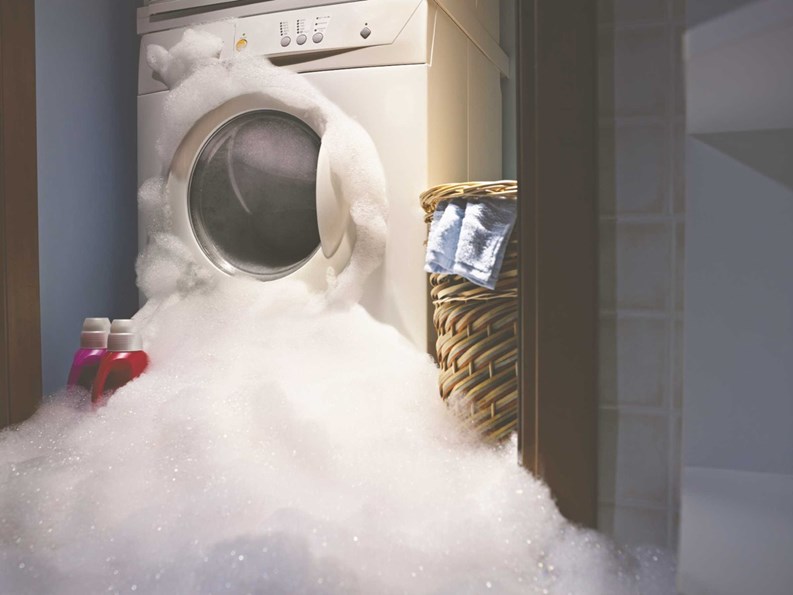In an online forum, Sharon complains about her upstairs neighbor and begs for advice. It seems that her neighbor had installed a washing machine in the unit, even though there was one already downstairs for the residents of her six-unit building to use. As a result of the neighbor’s improper installation, her appliance overflowed, resulting in a flood of water that came pouring into Sharon’s unit through heating and air vents. Now, Sharon’s wall-to-wall carpeting is ruined and she’s concerned about mold and other damage.
This is not an uncommon occurrence, here at The Chicagoland Cooperator we receive numerous letters and e-mails from readers who are in the same situation as Sharon. In-unit amenities, such as appliances, are a hot ticket item. Unit owners will not be deterred in their quest to have the appliances that their neighbors have, regardless of how professionally or unprofessionally they are installed. Additionally, in this economic climate, where developers and sellers are looking for any hook that might lure a potential buyer, in-unit amenities have become a promotional tool to perhaps sell vacant units.
New vs. Old Building
Units in older buildings were never designed to handle washers, dryers, trash compactors or dishwashers. However, in order to sell units, many developers, and unit owners themselves, are retrofitting kitchens and closets to accommodate these appliances. This can lead to major problems since the infrastructure of older buildings just can't handle the additional workload.
In the case of new construction, many developers are cutting economic corners to provide these amenities. The use of cheap material, shoddy construction and lack of insulation may lead to headaches and litigation later on. The rule “caveat emptor,” more commonly known as “buyer beware” applies. Potential buyers are encouraged to test in-unit appliances to ensure that they are functioning properly and look for clues that their neighbor’s appliances may not be working as they should.
Amenities, Amenities, Amenities
Certain appliances, such as washing machines, dryers, dishwashers and trash compactors, are very attractive features for a condo or homeowners association residents although many of the older buildings still have a central laundry room. “Obviously, the newer anything built from 1990 to year-to-date would most likely have in-unit connections,” says Chris Bowling, who is the Midwest district sales manager of Mac-Gray Intelligent Laundry Systems.
“But most residents do not have extra money to purchase a washer and dryer and for the costs of maintenance associated with them. In Chicago, the older communities don’t have the infrastructure, such as the plumbing and venting, to accommodate these appliances. And let’s face it, everyone is busy and no one likes to do laundry, so in a community room residents can do more than one load at a time, getting it done faster.”
Bowling also explains that typically, in-unit washers and dryers use much more water and drive utility costs up, require in-unit connections, plumbing, gas, electrical, and venting which can be expensive. But residents do really like to have something of their own and may even try to sneak in an appliance if they can. Unfortunately, these appliances can cause leaks, noise and vibration issues between residents, and can also create a major fire risk.
Another resident complained in another online forum that he lives in a co-op and a broken pipe from a dishwasher the upstairs neighbors installed in the kitchen above caused water to flow into his newly renovated downstairs unit. The kitchen was destroyed and there was water damage in almost every room of the apartment and, he says, in almost every unit under the upstairs unit.
To Ban or Not to Ban?
Dishwashers not only cause leaks but have also been known to be a fire hazard, due to electrical failure in the dishwasher’s heating element. That’s a scary concept considering that residents will often run their dishwashers when they are sleeping or not at home and if a fire breaks out during this time it can cause even more substantial damage.
In a November CBS news report, it was reported that dishwashers catching fire is becoming a disturbing trend with brands like KitchenAid, Kenmore and Whirlpool. The report stated that a consumer website lists hundreds of complaints regarding KitchenAid, Kenmore and Whirlpool dishwashers of various models, ranging from almost new to 10 years old. The report also states that 15 of those that were reported were from the Chicago area. A class action suit against the appliance companies has recently been filed.
On a regular basis, Joel Davis of Community Association Underwriters of America, an insurer in Hoffman Estates, sees the resulting structural and financial damage that these appliances can cause to units and to buildings. “Washing machine hoses can become detached and leak, especially when someone isn’t home,” he says.
These leaks not only affect the unit owner, but can damage the common areas of the building, forcing the building to make a claim. However, if the building is damaged and too many claims are filed, Davis says it can result in a problem with the building’s insurance policy. “If there is a building with multiple claims due to water damage from the appliances of unit owners, we’ll want to know what they have done to correct this,” he says. “If nothing has been done, or if we give suggestions and they aren’t done, it can lead to a non-renewal of insurance.”
Davis encourages the board and management to educate their residents on what is covered and not covered when it comes to insurance and property damage.
For example, says Davis, if a unit owner on the 20th floor has a flood that causes damage to other units, the building’s master policy pays first for damaged common elements. “This damage can be charged back to the unit where the damage originated,” he says. “The Condominium Act of Illinois allows the board to charge back to the unit where it began and let them file a claim under their homeowner’s policy. So if the building has a $10,000 deductible and the damage is $4,000, it’s beneath your deductible so you’re charging it back to the unit owner.”
Still other management companies take it for granted that residents will have in-unit appliances, and make no rules about them at all. This can lead to some serious problems, but to prevent these problems from happening, some high-rise buildings are now outlawing in-unit washing machines dishwashers and other appliances entirely; while others move to outlaw them but 'grandfather in' existing owners who already own these items.
Howard Schechter, a partner at the law firm of Schechter & Brucker located in New York City, explains that boards generally have the right to ban certain appliances. To make these changes, the board typically creates a “house rule.” Under the lease the board is given power to adopt rules and regulations and that power can include prohibiting appliances that may have an adverse effect in the building.”
Coming to a Compromise
Michael Baum of Baum Property Management located in Aurora says that his unit owners typically have a washer, dryer and dishwasher in the unit, but adds that should something happen with these appliances, Section 11 of the Condominium Act says that a person who has a leak is responsible for the damages.
“However, we usually see more leaks from showers, and an overflow in bathtubs versus hot water heater and appliance leaks,” says Baum. “The number one cause of leaks in our units is on the first hot day, we’ll get a dozen calls for leaks coming from the air conditioning condensation tube.”
Today, to prevent these problems from happening, some high-rise buildings outlaw in-unit washing machines, dishwashers and other appliances entirely; while others move to outlaw them but 'grandfather in' existing owners who already own these items. But taking an amenity away from a resident who already has been enjoying its perks may not sit well with them.
Schechter says that the better approach is to require that appropriate safeguards be installed on these appliances. There are systems that sound an alarm when it detects water on the floor and immediately turns off the water supply to the washing machine. It then sounds an alarm to let you know that there has been a problem. There are also alarms for when a leak has been detected.
Appliances will always come with some sort of a problem, but he says that it shouldn’t discourage the management or board from considering adding other appliances as amenities. “The board should be aware that as technology changes and new appliances become available that people find desirable, their immediate reaction shouldn’t be ‘we don’t want that’,” says Schechter.
Instead, the manager, board or owner should look into how they can protect the building and still continue to provide their residents with these amenities.
Lisa Iannucci is a freelance writer and a frequent contributor to The Chicagoland Cooperator.







Leave a Comment